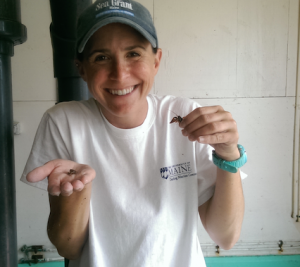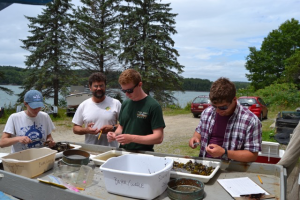Is deeper water a refuge for lobsters in a warming ocean?

NOTE: This post was written by Amalia Harrington, a graduate student in Rick Wahle’s lab at the Darling Marine Center, working on Wahle’s latest Sea Grant research project.
It is no secret that the American lobster supports the most productive fishery in Maine. Many researchers have dedicated their careers to understanding the biology of this important species. But big questions remain. What makes good habitat for baby lobsters when they “settle” to the ocean floor? Why have we seen a decline in the number of lobsters settling in areas historically known to be “good” lobster habitat?
Over the next two years, I have the opportunity to participate in a collaborative effort between University of Maine researchers, Maine Department of Marine Resources scientists, and lobster fishermen to figure out the relationship between temperature, depth, and the settlement of lobsters. In talking with different researchers and fishermen and women, there doesn’t seem to be much consensus regarding the idea of settlement in deep water. One idea is that ocean warming has made deeper areas of the seafloor more appealing to baby lobsters. Another, gloomier idea, is that warmer temperatures are simply making it more difficult for adults to successfully produce as many baby lobsters as in previous years. Our project hopes to sort out these different ideas. If we do find lobsters settling in deepwater areas, then we can start to look at what might be driving this shift and see if temperature may play a role. If we don’t find any settling lobsters in these deeper regions, this could indicate a large decline in settlement and we might expect some (potentially) big changes to the fishery in the near future.

This project is a great opportunity for me, as a student, because I get to work with both industry members and government researchers. The best part about this kind of collaboration is the fact that these three different groups (government, industry, and university researchers) bring their own perspective and approach to addressing the same question. So far, the most exciting part of this collaboration has been working with the fishermen. I’ve worked on university-industry partnership projects before, but never in Maine. It has been an amazing experience going out with the different fishermen, and I’ve really enjoyed watching them work. Their knowledge of their individual fishing areas is truly remarkable, and it has been a great learning experience. These kinds of collaborations not only make use of, but rely quite heavily on, this amazing (yet often underappreciated) knowledge base of the men and women who work on the water.
